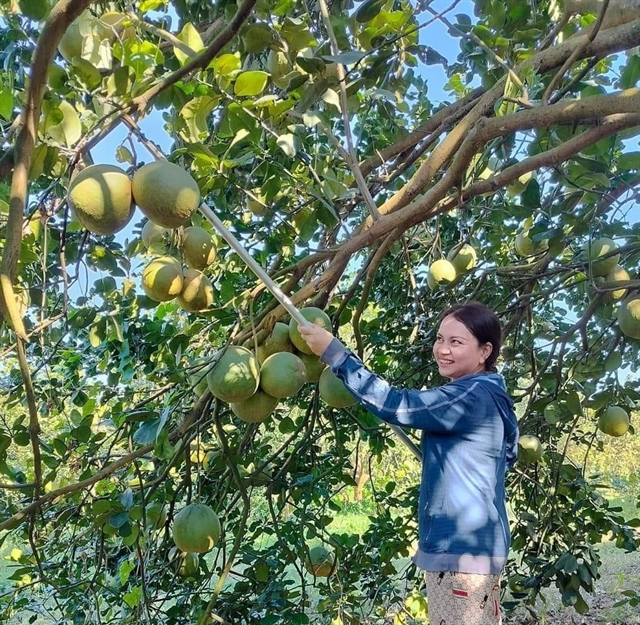 Society
Society

 |
| A grapefruit orchard belonging to the Long Tân Fruit Co-operative in Bình Phước Province’s Phú Riềng District with global good agricultural (GlobalGAP) standards certification. – VNA/VNS Photo |
BÌNH PHƯỚC – The south-eastern province of Bình Phước is encouraging the development of co-operatives of all sizes in various sectors.
According to Trần Văn Mi, deputy chairman of its People’s Committee, efficient co-operatives are provided support so that they become exemplary ones, expand and attract individuals, organisations and companies to participate in them or link up with them.
The province plans to set up 35 new co-operatives this year.
It hopes to have 60 agricultural co-operatives that use technology for production and sales of products and ensure origin traceability for them.
It also plans to have 55 agricultural co-operatives linked with companies to develop value chains.
To achieve the targets, it will improve oversight of the collective economy to mobilise resources for its development and implement support policies.
Relevant agencies will monitor co-operatives and take measures to mitigate any difficulties they might face.
The province will instruct its Co-operative Development Support Fund to provide soft loans for expanding co-operatives.
It will encourage co-operative groups and co-operatives to participate in the fourth industrial revolution and help them make the digital transformation.
It is drafting plans for trade promotions and investing in infrastructure for the collective economy.
There were 334 co-operatives and 1,390 co-operative groups as of the end of last year.
Nguyễn Thanh Phương, chairman of the province Co-operative Alliance, said co-operatives were encouraged to apply standard processes for production and quality management and offered assistance.
It helped co-operatives strengthen linkages with other stakeholders, especially companies, to develop sustainable value chains for their products, he said.
The province’s collective economy had developed various models and co-operatives had developed linkages for producing and selling their products, he added.
Key products such as pigs, chicken, cashew, pepper, and fruits are farmed on a large scale by co-operatives and meet high quality requirements, according to the chairman.
They have high economic efficiency and are exported, thus increasing the incomes and stabilising the lives of co-operatives’ members.
For instance, the province has 24 co-operatives, co-operative groups and farms growing cashew, and they are linked with 10 processing companies to grow 3,500ha of the nuts to US and EU organic standards.
Bình Phước is the country’s largest cashew producing province with more than 150,000ha of the crop, or nearly 50 per cent of the country’s total.
Điểu Tân of Bù Đăng District’s Đắk Nhau Commune joined a local co-operative to grow cashew under organic standards and is taught tending techniques.
He feels secure about adopting organic standards because the co-operative always pays higher than market prices for his cashew.
“I was provided with [free] fertilisers and plant protection chemicals [by the co-operative].”
Many co-operatives have developed linkages with other stakeholders and this has helped their members improve incomes and ensure sustainability in production.
Phạm Thị Hậu, deputy director of the Đồng Xanh organic agriculture co-operative in Bù Đăng District, said the co-operative, 80 per cent of whose members are ethnic people, had developed linkages with various stakeholders.
The province’s financial subsidies and training for farmers in new growing techniques had helped its members increase yields and incomes, she said.
It chose four cashew co-operatives and one fruit co-operative to subsidise, providing VNĐ1.9 billion (US$77,000) since 2019.
The co-operatives used the money to provide their members with free inputs for cultivation, help them package and label their products and build facilities for semi-processing of their produce.– VNS